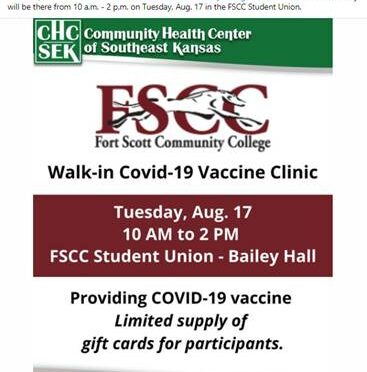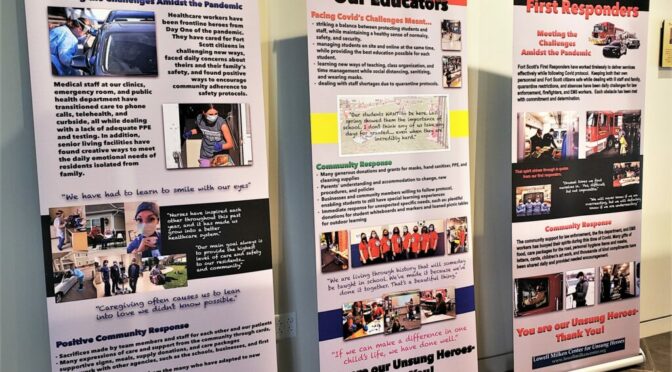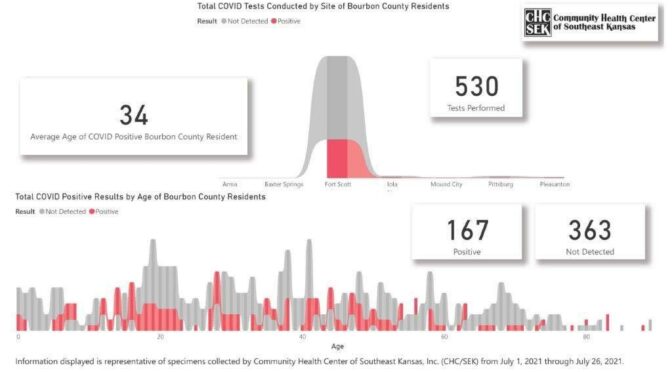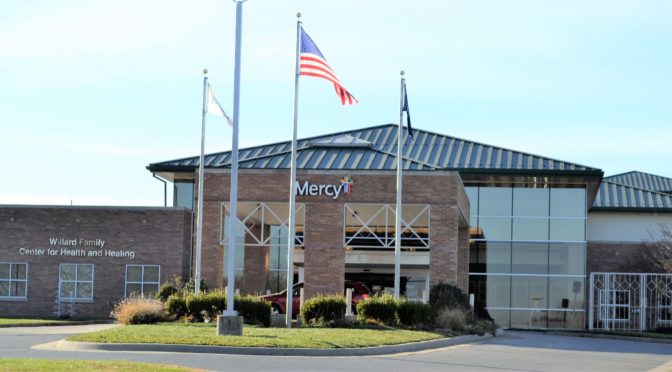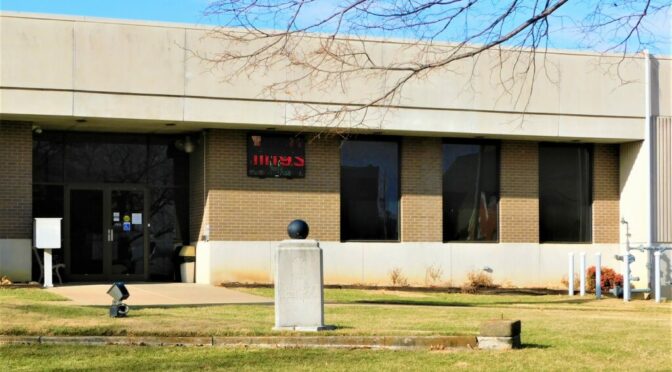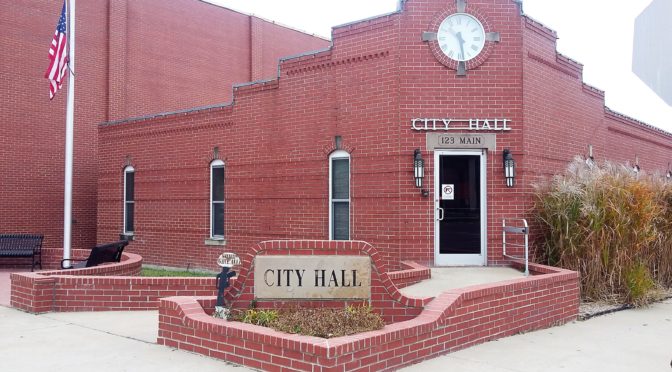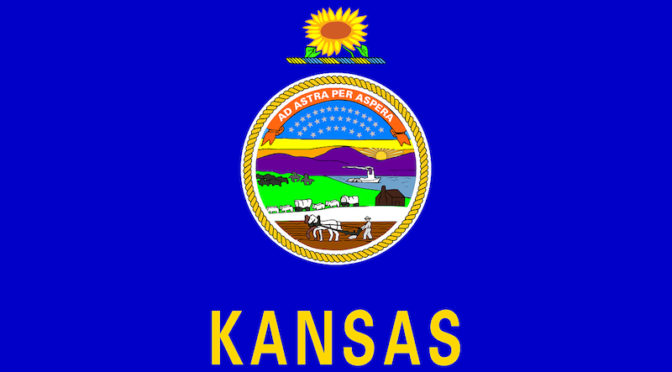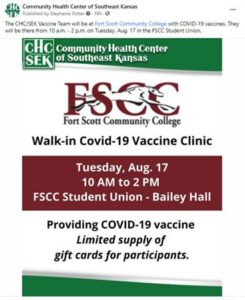
Category Archives: Health Care
Increase in Fatal Drug Overdoses
Nationwide increase in fatal drug overdoses prompts education on treatment and naloxone
~Prevention and resources key to overdose prevention~
TOPEKA – In light of a nationwide fatal drug overdose trend, the Kansas Department of Health and Environment (KDHE) encourages awareness and education regarding drug overdose prevention in Kansas, including awareness of treatment resources and access to naloxone.
“Fatal drug overdoses have increased steadily for decades in both the U.S. and Kansas, and in 2020 there was an increase yet again,” Dr. Lee Norman, KDHE Secretary, said. “Beyond increased funding for mental health and substance use treatment, we must commit to working across all sectors – law enforcement, judicial, healthcare, religious, schools, and communities – to reverse this trend.”
Nationwide, between 2019 and 2020 there was a 30 percent increase in drug overdose fatalities with more than 90,000 reported. Drug overdose fatalities increased in Kansas by 24 percent, from 393 in 2019 to 477 in 2020. Of those 2020 numbers, 183 involved psychostimulants, such as methamphetamine, 161 involved synthetic opioids, such as fentanyl, and 71 involved prescription opioids. Overdose deaths involving any prescription or illicit opioid accounted for 53.2% of all fatal overdoses in 2020. It is of note that more than one drug can be involved in a fatal drug overdose, so these values are not mutually exclusive.
Fatal overdoses were significantly higher among males compared to females, at 63.9% and 36.1% of the total. Additionally, fatal overdoses were highest among age groups between 25 and 54, comprising 296 (62%) of all overdose deaths.
Kansas is following similar overdose death trends observed nationally during the COVID-19 pandemic. Synthetic opioid overdoses, primarily caused by fentanyl, have driven this surge in overdose deaths. This is largely attributed to increased availability, accessibility, and use of illegally manufactured fentanyl. Fentanyl is a powerful synthetic opioid that is often combined with other drugs, such as heroin and cocaine, or used as a standalone drug. Due to its potency, fentanyl-involved overdoses have a fast onset and can be difficult to reverse. In Kansas, synthetic opioid overdose deaths, mainly caused by fentanyl, increased by 130% from 2019 to 2020.
“Substance use disorders (SUDs) are extremely complex and the reasons for the increase may depend upon the individual and their own determinants (biological, psychological, social, spiritual),” Dr. Norman said. “What we do know is that there is a need for more substance use disorder and Behavioral resources in our state.”
Connecting individuals to SUD services is best practice for drug overdose prevention. Recovery from SUD is possible. Those in need of help can call Kansas’s SUD hotline at 866-645-8216 or visit findtreatment.gov to locate treatment services.
KDHE recommends that individuals who use substances and their support networks have naloxone and are trained in administration processes. Naloxone is a medication that reverses the effects of an opioid overdose. Kansas allows pharmacists to dispense naloxone to patients without a prescription pursuant to KAR 68-7-23. Visit ktracs.ks.gov/pharmacists/naloxone-dispensing to find a naloxone-dispensing pharmacy near you.
DCCCA, Inc. has a naloxone program which is funded by the Kansas Department of Aging and Disability Services (KDADS) through the State Opioid Response (SOR) grant. DCCCA has a limited supply of naloxone kits available for those who are unable to access it through a local pharmacy or other means. Additionally, DCCCA offers free naloxone training. Please visit dccca.org/naloxone-program for more information.
Please visit www.http://www.preventoverdoseks.org for resources, epidemiological data, and more information on Kansas’s efforts to prevent drug overdoses.
###
Center Honors Fort Scott’s Frontline Workers
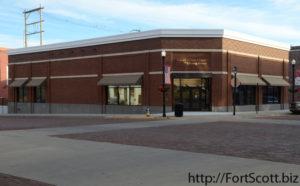
On July 28, the Lowell Milken Center for Unsung Heroes began a new exhibit entitled”Fort Scott’s Frontline Workers”, highlighting groups of local COVID-19 workers.
Hours at the center, located on Main Street at Wall Street in downtown Fort Scott are Monday through Friday from 10 a.m. to 5 p.m. and Saturdays from 10 a.m. to 4 p.m.
The exhibition is pictorial with text that honors first responders from four local agencies, health care workers from five local agencies, and educators in five local public and private schools.
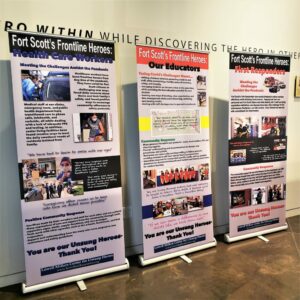
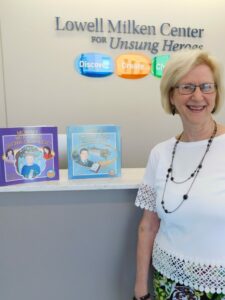
This new exhibit has been made possible with funds received from a Fort Scott Area Community Foundation grant, according to an LMC press release.
“The Lowell Milken Center’s Fort Scott’s Frontline Heroes project highlights frontline professions within our community who have been directly dealing with pandemic issues in order to provide safe and direct action for our citizens,” according to the press release.
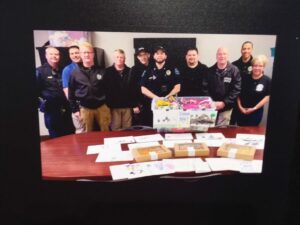
The following are recognized: firefighters, law enforcement officers, emergency medical services workers, health care workers from Community Health Center of Southeast Kansas, Ascension Via Christi Emergency Department, Southeast Kansas Multi-County Health Department, and long-term care facilities, assisted/independent living facilities, and local teachers/administrators at schools.
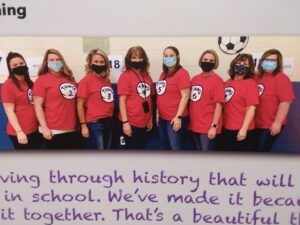
“The LMC believes these groups of workers are truly Fort Scott’s unsung heroes, as they have given so much of themselves to our community’s citizens during the pandemic and continue to do so,” according to the press release. “We encourage all Fort Scott area citizens to support these heroes by viewing the new exhibits at the Lowell Milken Center, sharing words of gratitude and support in the LMC guest book and through the LMC’s social media pages on Facebook – www.facebook.com/LowellMilkenCenter, Twitter – https://twitter.com/LowellMilkenCtr, and Instagram – www.instagram.com/LowellMilkenCtr.”
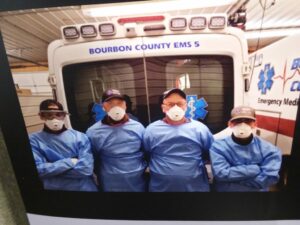
About the Lowell Milken Center: The Lowell Milken Center is a non-profit 501 © (3) that works with students and educators within a range of diverse academic disciplines, to develop projects focused on unsung heroes. Once their projects are finished, the student’s unsung heroes are shared in the Hall of Unsung Heroes or on the website, encouraging people all over the world to discover their individual influence and obligation to take actions that improve the lives of others. The Hall of Unsung Heroes is proudly located in Southeast Kansas and showcases some of the top projects developed in collaboration with the Center.
Bourbon County COVID-19 Since July 1: Positive Tests Up, Average Age Is 34

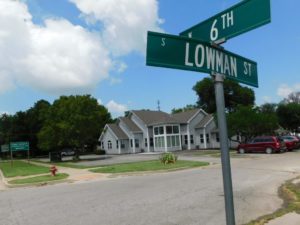
“At this time, I would recommend that if Bourbon County residents vaccinated or unvaccinated cannot socially distance themselves from others in public settings, that they wear a mask,” said Rebecca Johnson, Southeast Kansas Multi-County Health Department Administrator said. “When I left work yesterday evening our active COVID-19 case count was up to 97.”
“This surge compares closest with the surge we had around Thanksgiving time last year,” she said.
“There have been breakthrough cases where fully vaccinated people have contracted COVID-19,” she said. “We have had several cases of the Delta variant, but according to KDHE’s last report, have not had any from the tests they’ve received, in the last three weeks.”
“The Delta variant is a highly contagious strain of the COVID-19 virus that has been detected in the states that surround us as well as many counties that surround Bourbon,” Johnson said.
“I also recommend getting vaccinated if you are able. Bourbon County has four COVID-19 providers: Bourbon County Health Department, Walmart, CHC-SEK, and Walgreens. Practice social distancing, use good hygiene, and stay home when sick!” she said.
Mondays are walk-in days, call for an appointment (620)223-4464.
CHC
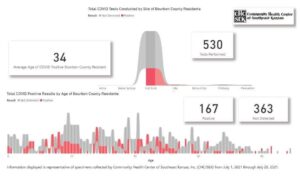
Since July 1, 2021, the Community Health Center of Southeast Kansas has tested 530 Bourbon County residents for COVID-19, Robert Poole, Communication and Marketing Director at CHC/SEK said.
“Of those, 167 tested positive for COVID-19,” he said. “The average age of a COVID-19 positive patient in Bourbon County, for the current month, is currently 34 years old.”
“These are CHC/SEK internal tracking numbers, and do not include the efforts and statistics of the Bourbon County Health Department, Via Christi ER, or other testers in Bourbon County,” Poole said.
According to information provided by CHC/SEK, if one tests positive for COVID-19, they should talk to their healthcare provider about monoclonal antibody treatment, which has been granted emergency use authorization from the U.S. Food and Drug Administration for patients with mild or moderate COVID-19, who are at high risk of developing severe symptoms. This treatment may reduce COVID-19 hospitalizations if given from 10 days from the onset of symptoms.
It is given by infusion at an infusion site with a provider’s order.
This treatment is for those who test positive for the disease, are 12 years and older, and within 10 days of onset of symptoms.
It is also for those over 65 years old, are obese/overweight based on CDC charts, pregnant, have chronic kidney disease, diabetes, immunosuppressive disease, chronic lung disease, Sickle Cell disease, neurodevelopmental disorders or have medical-related technology dependence: tracheostomy, gastrostomy, positive pressure ventilation, not related to COVID-19.
To get tested or get a vaccine contact CHC at 620-231-9873.

Girard Medical Center of Uniontown Clinic also has rapid testing of COVID-19 available and can schedule a vaccine as well. The clinic phone number is 620-756-4111.
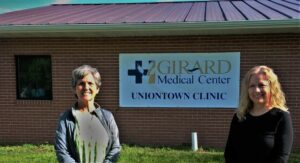
CDC
CDC COVID Data Tracker
Vaccinations in Bourbon County, Kansas
Percent of Kansas’s fully vaccinated recipients with valid county of residence: 93.4%
States with lower percentages for valid county of residence should be interpreted with caution.
People Vaccinated
Total
% of Total Population
Population ≥ 12 Years of Age
% of Population ≥ 12 Years of Age
Population ≥ 18 Years of Age
% of Population ≥ 18 Years of Age
Population ≥ 65 Years of Age
% of Population ≥ 65 Years of Age
Former Mercy Hospital Building Being Considered By Noble Health
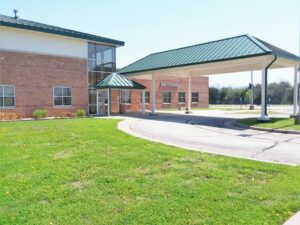
The Fort Scott City Commission and the Bourbon County Commission signed a contract last week to facilitate Noble Health Corp’s feasibility study of the former Mercy Hospital building.
Mercy Hospital closed its doors in December 2018, following declining patient numbers and shrinking reimbursement.
To view Mercy’s closing announcement:
https://fortscott.biz/news/mercy-hospital-fort-scott-to-close
The building is located just off Hwy. 69 on Fort Scott’s south side at 401 Woodland Hills Blvd.
It currently houses the Community Health Center of Southeast Kansas clinic and the Via Christi Emergency Department. Their leases are ending in 2022.
Noble Health Corp., Kansas City, announced on June 25, 2021, that it will explore the possibility of reopening an acute care hospital facility in Fort Scott, Kansas.
To view the Noble Health Corp. announcement:
Reopening An Acute Care Hospital In Fort Scott Being Explored by Noble Health
The city will contribute $200,000, the county $800,000 towards the feasibility study, according to the contract. The local government entities will be using American Rescue Plan money from the federal government for the project, according to Bourbon County Commissioner Clifton Beth.
The American Rescue Plan Act 2021 can be viewed at ARP Act SxS – as of 02.22.21.pdf (house.gov)
The feasibility study will investigate the condition of title to the development property, the physical condition of the property, the zoning, the economic feasibility, and all matters relevant to the acquisition, usage, operation, valuation, and marketability of the property and the project, as the developer deems appropriate
Should the project prove feasible, the county agrees to contribute at least $2,000,000 to finance certain costs and expenses related to and associated with the project, according to the contract.
The following is the agreement that the Fort Scott City Commission and the Bourbon County Commissioners signed with Access Medical Advisors LLC and Noble Health Corp. on July 21, 2021.
Continue reading Former Mercy Hospital Building Being Considered By Noble Health
Special Bourbon County Commission Meeting Agenda For July 23
Agenda
Bourbon County Commission Room
1st Floor, County Courthouse
210 S. National Avenue
Fort Scott, KS 66701
Tuesdays starting at 9:00
Date: July 23, 2021
1st District-Lynne Oharah Minutes: Approved: _______________
2nd District-Jim Harris Corrected: _______________________
3rd District-Clifton Beth Adjourned at: _______________
County Clerk-Kendell Mason
MEETING WILL BE HELD IN THE COMMISSION ROOM @ 9am.
Call to Order
- Flag Salute
- Wire Transfer to Noble Health
FS Commission Special Meeting to Approve Health Care Contract
NOTICE OF AND AGENDA FOR
SPECIAL MEETING OF
FORT SCOTT CITY COMMISSION
CITY HALL
CITY COMMISSION MEETING ROOM
123 SOUTH MAIN STREET
JULY 22, 2021
12:00 P.M.
K. Allen P. Allen R. Nichols L. Watts J. Jones
I. Approval of contract with Noble Health Care
II. Adjournment
Increased COVID-19 Cases; Increased Demand For COVID-19 Testing
7/15/2021
With an increased demand for COVID-19 testing, CHC/SEK would like to remind patients to call ahead for an appointment to their local clinic before arriving for testing.
In most cases, patients should remain in their car unless instructed otherwise. Most tests will be conducted at a designated parking space at the clinic.
CHC/SEK is seeing an increase in COVID-19 cases across southeast Kansas and its Miami, OK Clinic. With the rise in positive cases, hospitalizations are on the increase, and Crawford County has seen COVID deaths in the past 2 weeks.
This increase in viral activity is attributed to the delta variant, making its way across the country and almost exclusively affecting unvaccinated individuals.
While many of the current COVID cases display the classic symptoms of COVID-19, other patients are experiencing “sinus complaints” and body aches or mild upper respiratory complaints.
CHC/SEK recommends anyone with symptoms get tested.
To protect other patients and staff members, patients experiencing COVID-related symptoms are asked wear a mask upon entering the clinic.
COVID-19 symptoms can include fever or chills, cough, shortness of breath or difficulty breathing, fatigue, muscle or body aches, headache, new loss of taste or smell, sore throat, congestion or runny nose, nausea or vomiting and diarrhea.
About 80-90% of new cases, 95% of hospitalizations, and 98% of deaths are in unvaccinated (or not fully vaccinated) individuals, according to Dr. Linda Bean, Chief Medical Officer at CHC/SEK.
“The threat of COVID is still as real as it was last year, but the difference this year is that it is preventable, she says. “Vaccines are readily available, and there is still time to have our school-age students twelve years and older vaccinated by the start of school.”
All CHC/SEK clinics have COVID-19 vaccines available, and there is never a cost for the recipient. Vaccinations are available on a walk-in basis or by appointment.
Dr. Bean noted that it is still possible (though less likely) to get COVID even if you have been vaccinated and this does not mean that the vaccine has failed.
“The primary goal of the vaccine is to reduce transmission, serious illness, and death – to date, the vaccines are very effective, even against the current variants,” she says.
There are a lot of myths and misconceptions circulating regarding the COVID-19 vaccines, Bean says. “We encourage anyone who has questions to call us. We have very knowledgeable people who would be would be happy to address those concerns.”
###
Unvaccinated Individuals Comprise 90% of New COVID Cases In The Region
CHC/SEK requests patients to wear masks in clinics
Community Health Center of Southeast Kansas clinics are seeing an increase in COVID-19 cases and is reminding all patients to wear a mask during their clinic visits. Masks are also available for patients who need them.
COVID-19 testing is also available at all locations, and patients are asked to call ahead to their local clinic and request a test, and to remain in their cars for testing.
Unvaccinated individuals have comprised about 90% of the new cases, 95% of hospitalizations, and 98% of virus-related deaths in our region, according to CHC/SEK Chief Medical Officer Linda Bean D.O.
“Vaccination against COVID-19 continues to be the best way to protect yourself and others from serious or long-term effects of the virus,” Bean says. “CHC/SEK has now given over 40,000 doses of COVID-19 vaccine which has shown to be safe and effective protection from the virus.”
COVID-19 vaccinations are available at all CHC/SEK clinics for anyone age 12 and older. People can walk-in or can request an appointment by calling their local CHC/SEK clinic or by going online at https://chcsek.org/getmyshot/
At this time the current vaccines appear to be effective against the variant Delta strains of COVID-19 which is more transmissible and can cause more significant illness in younger patients.
KDHE Encourages Vaccinations and Precautions this Fourth of July Weekend
TOPEKA – The Kansas Department of Health and Environment (KDHE) urges Kansans to take proactive measures this holiday weekend to protect themselves and their loved ones from the rapidly spreading Delta variant.
“As we all begin to travel and gather with friends and family, it’s critically important to keep our communities and loved ones safe,” Governor Laura Kelly said. “We all have a role to play in preventing the spread of COVID-19, especially as new strains emerge. We can all do our part to keep our communities safe by getting vaccinated and following the CDC guidelines.”
This week, Kansas has recorded 1,211 news cases, 12 deaths and also seen an increase in the presence of the Delta variant. There are three deaths recorded in Kansas attributable to the Delta variant.
“This is a fast-spreading variant that spreads quickly in communities that have the lowest vaccination rates,” Dr. Lee Norman, KDHE Secretary said. “Please get vaccinated and in the interim, please take precautions to protect yourself and your loved ones.”
If Kansans are planning to attend large gatherings, here are additional recommendations from CDC:
If you have COVID-19 symptoms, stay home.
Stay at least 6 feet away from people who do not live with you.
- You are more likely to get or spread COVID-19 when you are in close contact with people who don’t live with you.
- Remember that people without symptoms or with a recent negative test result can still spread COVID-19 to others.
- Choose safer outdoor venues if possible.
- Choose venues that limit seating and allow for social distancing and select your seat or place to stand based on your ability to stay at least 6 feet from others.
- Arrive to the event early or at off-peak times to avoid crowding and congested areas.
- Avoid using restroom facilities or concession areas at high traffic times, such as intermission, half-time, or immediately after the event.
Avoid crowded, poorly ventilated indoor spaces.
- As much as possible, avoid crowds and indoor spaces that do not offer fresh air from the outdoors.
- You are less likely to get or spread COVID-19 during outdoor activities. Look for seating options that are outside or have proper ventilation with outdoor air, such as tents that have open doors or rolled up sides.
Wear a mask.
- Wear a mask with two or more layers to stop the spread of COVID-19 to protect yourself and others.
- Wear your mask over your nose and mouth, secure it under your chin, and make sure it fits snugly against the sides of your face.
- Keep a spare mask in case your mask becomes wet from moisture in your breath or from snow or rain.
If you have symptoms or were exposed to someone diagnosed with COVID-19, get tested. Testing is available by visiting KnowbeforeyougoKS.com.
To find a vaccine near you, visit www.vaccines.gov/.
###
Mosquito Prevention
Red, Bite, and Blue: KDHE Recommends Mosquito Bite Prevention Over July 4th Holiday
Topeka – The Kansas Department of Health and Environment recommends Kansans take preventive measures against mosquito bites over the July 4th holiday. Five of six regions in Kansas are now at the ‘High’ risk level for West Nile virus. Mosquito surveillance in Reno, Sedgwick, and Shawnee counties has shown an increase Culex mosquitoes which can spread West Nile virus and other viruses that can affect humans and horses. This species of mosquitoes is most active at dawn and dusk.
West Nile virus can be spread to people through bites from infected mosquitoes, but it is not contagious from person to person. Symptoms range from a slight headache and low-grade fever to swelling of the brain or brain tissue and, in rare cases, death. Since 2002 there have been 692 cases and 35 deaths in Kansans from West Nile virus. People who have had West Nile virus before are considered immune. Cases are most common from mid-July through late September.
KDHE has developed West Nile virus risk levels to help guide prevention efforts for both communities and individuals. These risk level reports are updated weekly at http://www.kdheks.gov/epi/arboviral_disease.htm from mid-May to October.
KDHE recommends the following precautions to protect against West Nile virus:
- When you are outdoors, use insect repellent containing an EPA-registered active ingredient on skin and clothing, including DEET, picaridin, oil of lemon eucalyptus, or IR3535. Follow the directions on the package.
- Many mosquitoes are most active at dusk and dawn. Be sure to use insect repellent and wear long sleeves and pants at these times or consider staying indoors during these hours.
- The elderly or immunocompromised should consider limiting their exposure outside during dusk and dawn when the Culex species mosquitos are most active.
- Make sure you have good screens on your windows and doors to keep mosquitoes out.
- Get rid of mosquito breeding sites by emptying standing water from flower pots, buckets and barrels. Change the water in pet dishes and replace the water in bird baths weekly. Drill holes in tire swings so water drains out. Keep children’s wading pools empty and on their sides when they aren’t being used.
People should protect their horses too as West Nile virus in horses can be fatal. The virus can cause inflammation of the brain and spinal cord. Approximately 33% of horses infected with West Nile virus will die. A West Nile virus vaccine for horses is available and owners are encouraged to vaccinate or booster their animals. In addition, these mosquitoes can transmit heartworms to dogs. Contact your veterinarian to discuss a West Nile virus vaccine for your horses and heartworm prevention for your dogs.
KDHE maintains an Arboviral Disease Surveillance web page that is updated weekly: http://www.kdheks.gov/epi/arboviral_disease.htm. The Centers for Disease Control and Prevention provides this web page with additional information about West Nile virus and preventing mosquito bites: https://www.cdc.gov/westnile/prevention/index.html. For questions about West Nile virus or other arboviral diseases contact the KDHE Epidemiology Hotline at 877-427-7317.
51 Ventilated COVID Patients Last Week in Crawford County
Local health professionals encourage people to celebrate safely
Crawford County Covid-19 cases are increasing, as well as throughout the region and they are already affecting local and regional hospitals, according to Dr. Tim Stebbins, Crawford County Health Officer and Director at Ascension Via Christi Emergency Department.
With the July 4 holiday approaching, Stebbins is concerned that traditional celebrations, including family and community gatherings, will increase the risk for transmission of Covid-19 and cause possible serious medical impact, especially on those who are not vaccinated against the disease.
Since the initial wave of the Coronavirus pandemic, Via-Christi Hospital in Pittsburg has gone from single digits of Covid-19 patients weekly back up into the 20s, and last week to 51 including ventilated patients with admissions on track for similar numbers this week.
Stebbins says nationally, 80-90% of new infections are in the unvaccinated/nonimmune group, with more than 90% of hospitalizations in the same group. Over the last few months, 98% or more of the deaths from Covid-19 are in the unvaccinated/nonimmune group.
Health officials have confirmed some of the new infections in Crawford County are the Delta variant of Covid-19.
As of mid-June 2021, the CDC estimates the Delta variant is accounting for 20% of new cases in the United States. The delta variant is challenging because it is highly transmissible and affects the younger age groups.
In milder cases, infected individuals may mistake the symptoms for a bad cold and not realize they need to isolate. Common symptoms reported have been headaches, sore throat, a runny nose, or fever.
Testing for COVID-19 is an essential part of containing the disease, and the Community Health Center of Southeast Kansas has rapid testing available seven days a week. The Crawford County Health Department can also provide rapid testing.
For most vaccinated people, the current COVID-19 vaccines effectively prevent serious illness, hospitalization, and death from all current strains of the virus. Previous illness with Covid-19 also seems to provide some immunity from the disease.
“Everyone should consider their own risk when celebrating, including their own current health and vaccination or immune status,” Stebbins says. “If you have any immune compromising disease or illness, such as cancer, you should carefully weigh the risks and consider mitigation.”
Strategies to help prevent Covid-19 infection include handwashing, social distancing, and wearing a mask. It is especially important that all individuals, regardless of immune status, stay home if they think they might be ill.
The single greatest protection against COVID-19 for individuals age 12 and up is vaccination. Crawford County has a robust vaccination capability and vaccinations can be found through nearly all local pharmacies, SEK Urgent Care, PSU Health, Community Health Centers of Southeast Kansas, and the Crawford County Health Department. Three different vaccines are available in the County and vaccination is available to anyone 12 or older.
It is possible for all of us to celebrate this holiday safely and to minimize the risk of harm to our family and friends, Stebbins says. “Everyone should consider their own risk when celebrating including their current health and vaccination or immune status. We must all be smart in what we do, consider the risks, mitigate if appropriate, and seriously consider vaccination to prevent further spread and impact of this disease.”
